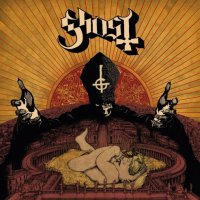
GHOST
Infestissumam
![]()
Universal Republic (2013)
Rating: 7/10

|
Where do I start? It seems that a majority of reviewers who’ve joined the mysterious cult of the band known as Ghost are too afraid to give such a band a negative review, being that these occult-influenced Swedes are very much the “in thing” at the moment.
I wasn’t overly impressed by the band’s 2010 debut album Opus Eponymous, my opinion being that the combo, for all their esoteric nonsense, was merely style over substance. So I hoped and prayed to the dark lords of hell that Infestissumam would prove me wrong, but again I’m left scratching my head in frustration.
I’m of the view that these guys wouldn’t have made such an impact if it weren’t for their frequent visits to the local costume store – Papa Emeritus II and his Nameless Ghouls are clearly of the belief that every day is Halloween – and their brand of pop-sike just doesn’t live up to the hype. I’m guessing that this sound is new to many people, and this is why Ghost have made such an impact on the scene, but peel back the foggy veil and you’ll find that Infestissumam has a limited shelf life and wears thin very quickly.
This time around the creepy combo aim for a darker approach, although a majority of tracks may disappoint the metalheads among you who may have been expecting a heavier affair. ‘Per Aspera Ad Inferi’ is probably the album’s doomiest cut, and the chugging guitars allow easy access for the ears, given added 70s mysticism by the swirling organ and creaky musicianship that evokes images of obscure psychedelia that saturated the late 60s with its horror themes, but it soon becomes a predictable affair.
There is nothing original about Ghost whatsoever, the band simply finding their niche within the stale rock ’n’ roll circus at the moment which has become all too quickly drenched in occult rock imitation.
Infestissumam isn’t all bad, and Ghost do shine – albeit dimly – on the tip-toe creepiness of album closer ‘Monstrance Clock’ with its Munsters-style go-go beat and summery “Come together” chants. As usual, the organ wheezes over proceedings, bathing the musty catacombs in a kaleidoscopic light.
Elsewhere, ‘Jigolo Har Megiddo’ hops in on an upbeat plod that reminds me of The Kinks’ 1966 hit single ‘Sunny Afternoon’, before once again resorting to a watery doom-tinged pop rocker.
The big numbers of the album include the spooky ‘Year Zero’ with its eerie chants that sound as if they’ve been lifted from the local monastery. The track drifts into a poppy goth-laced echo, but there’s nothing here that enables it to rise above Pet Shop Boys at their most experimental. Yes, I said Pet Shop Boys; just check out that infectious drum beat.
‘Secular Haze’ is equally accessible, emerging from its mansion on a carousel jig. This is a carnival of unearthly delights that rides high on a King Diamond-styled groove, only lacking the metal, evoking images of rainy Blue Öyster Cult.
The main problem however with Ghost is their inability to rise above the mediocre, and much of Infestissumam is lacking in depth. Only the piano-led ‘Ghuleh / Zombie Queen’ with its vocal caress sends a chill – it’s an epic seven-minute prog haze that finally gets going on a swingin’ go-go beat. ‘Body And Blood’ is equally esoteric, but again has all the appeal of a Sunday afternoon spent standing outside a freezing cold church.
Ghost are all too happy to celebrate the existence of almighty Satan with their psych-rock, but I’m always left wanting more. The live experience is no doubt more rewarding, but how long these guys can keep up the theatre is something that remains to be seen, because despite the hype and gothic intentions, little of this transfers well to record.
Infestissumam offers us ten tracks, but it’s going to take a lot more than a handful of satanic sermons to drag me in. Papa Emeritus II and his clan of hooded ghouls are probably going to end up being pretty successful, but their true effects are something akin to a spring evening – mild at best. I’m sure they won’t lose any sleep over my review, but I’ll stick to The Vampires Of Dartmoore’s Dracula’s Music Cabinet (1969), Lucifer’s Black Mass (1971) and Bram Stoker’s Heavy Rock Spectacular (1972) for ghoulish sincerity.
Neil Arnold





